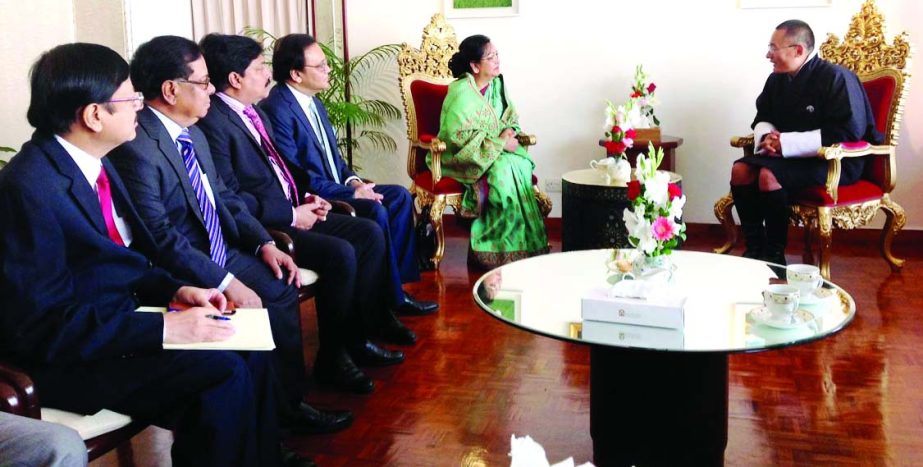
BSS, Rajshahi :
Creating considerable public awareness on safe and nutritious food is very vital side by side with their food security for ensuring a sound public health, development activists at a discussion said here today.
Speakers advocated this while addressing a daylong divisional seminar titled “Established Food Safety Culture in Bangladesh” held at Ashrai Training Center in the district yesterday. Bangladesh Food Safety Network (BFSN) and SHISUK jointly organized the event in association with FAO Food Safety Programme.
Commissioner of Rajshahi division Helaluddin Ahmed and Deputy Commissioner Mejbah Uddin Chowdhury addressed the inaugural session as chief and special guests respectively with Mohidul Haque, Member of BFSN, in the chair.
Divisional Director of Health Dr Hedayetul Islam, Deputy Director of Fisheries Saidur Rahman and Deputy Director of Animal Resources Mohir Uddin also spoke.
The Chief Guest mentioned that the adulterated and contaminated foods always pose serious threat to the public health and called for taking punitive measures against the food adulterators and contaminators so that none more dare to commit such type of crimes.
To that end, he underlined the need for intensifying the monitoring and surveillance activities by the authorities concerned including Rajshahi City Corporation and Pourasavas.
Deputy Commissioner Mejbah Uddin said the existing acts and the law enforcers alone would never be able to salvage the situation unless people from all walks of life became adequately aware about the harms of taking adulterated foods and took firm stand against such immoral mindset. ‘We need the people to come forward to stop these harmful practices,’ he added.
In his presentation, Dr John Ryder, Chief Technical Adviser of Food Safety Programme, elaborated on the concepts underlying outcome mapping as an element of outcome monitoring.
He stressed on the importance of assessing outcome and impact of the Food Safety Programme as it would provide evidence of the utility of such interventions particularly to donors and development agencies.
John Ryder said that the Bangladesh’s Food Safety Act-2013, once implemented could become a model for many countries across the globe. He described FAO’s systems-based to approach toward strengthening food safety in Bangladesh across the food chain from producer to consumer.
In his remarks, Prof. Shah Monir Hossain, Consultant of FAO, spoke of the gaps and overlaps in food control system in Bangladesh and how these would be overcome by implementation of the Act.
Creating considerable public awareness on safe and nutritious food is very vital side by side with their food security for ensuring a sound public health, development activists at a discussion said here today.
Speakers advocated this while addressing a daylong divisional seminar titled “Established Food Safety Culture in Bangladesh” held at Ashrai Training Center in the district yesterday. Bangladesh Food Safety Network (BFSN) and SHISUK jointly organized the event in association with FAO Food Safety Programme.
Commissioner of Rajshahi division Helaluddin Ahmed and Deputy Commissioner Mejbah Uddin Chowdhury addressed the inaugural session as chief and special guests respectively with Mohidul Haque, Member of BFSN, in the chair.
Divisional Director of Health Dr Hedayetul Islam, Deputy Director of Fisheries Saidur Rahman and Deputy Director of Animal Resources Mohir Uddin also spoke.
The Chief Guest mentioned that the adulterated and contaminated foods always pose serious threat to the public health and called for taking punitive measures against the food adulterators and contaminators so that none more dare to commit such type of crimes.
To that end, he underlined the need for intensifying the monitoring and surveillance activities by the authorities concerned including Rajshahi City Corporation and Pourasavas.
Deputy Commissioner Mejbah Uddin said the existing acts and the law enforcers alone would never be able to salvage the situation unless people from all walks of life became adequately aware about the harms of taking adulterated foods and took firm stand against such immoral mindset. ‘We need the people to come forward to stop these harmful practices,’ he added.
In his presentation, Dr John Ryder, Chief Technical Adviser of Food Safety Programme, elaborated on the concepts underlying outcome mapping as an element of outcome monitoring.
He stressed on the importance of assessing outcome and impact of the Food Safety Programme as it would provide evidence of the utility of such interventions particularly to donors and development agencies.
John Ryder said that the Bangladesh’s Food Safety Act-2013, once implemented could become a model for many countries across the globe. He described FAO’s systems-based to approach toward strengthening food safety in Bangladesh across the food chain from producer to consumer.
In his remarks, Prof. Shah Monir Hossain, Consultant of FAO, spoke of the gaps and overlaps in food control system in Bangladesh and how these would be overcome by implementation of the Act.

